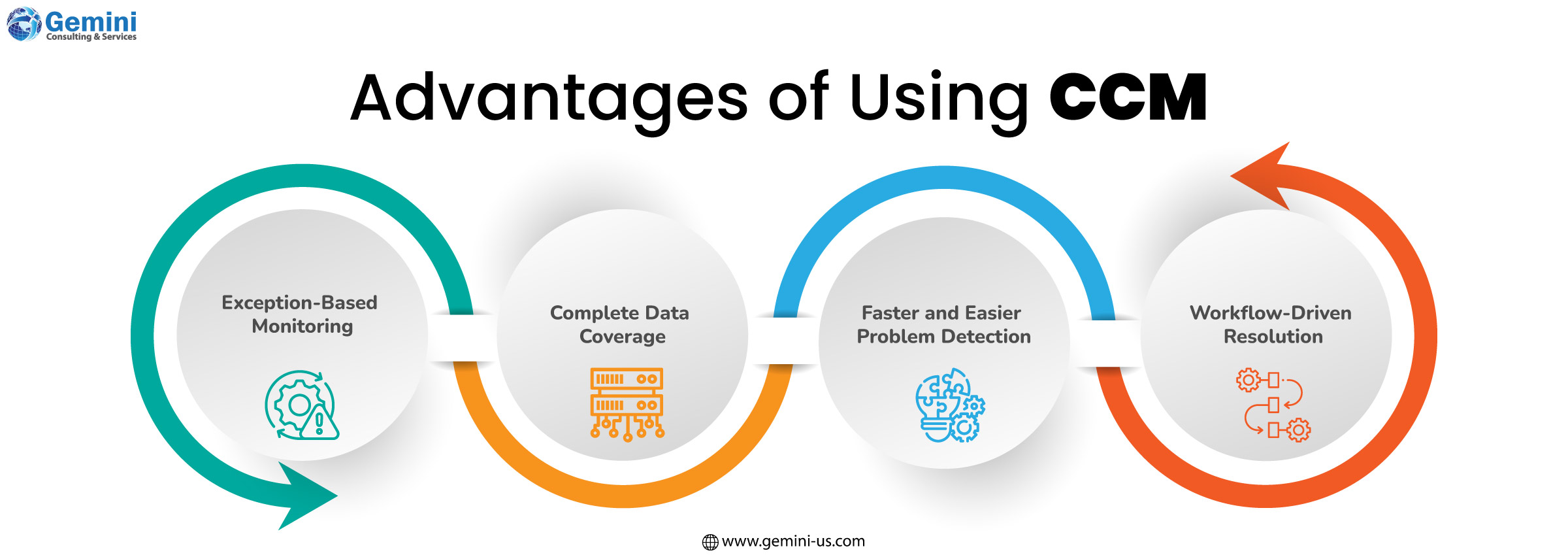Continuous Control Monitoring (CCM) is an essential feature of SAP Process Control. CMM feature helps enterprises to improve the automation of assessing control effectiveness. This system automatically retrieves data from the target system and analyzes it based on predefined criteria to detect any deviations from the control’s goals. When such deviations are found, they are reported as issues to the designated control owner, who is then tasked with addressing and resolving them.
To leverage CCM effectively, the GRC plug-in (GRCPINW) must be installed on the backend system where the pertinent data is stored.

Challenges with Manual Control Testing
In traditional settings, control testing is usually handled manually by internal audit or controls teams. This process involves gathering business information through interviews and walkthroughs with process owners, which is not only time-consuming but also presents challenges in coordinating with key personnel.s
Data analysis in a manual environment often relies on tools like Microsoft Excel, which involves considerable manual effort and is susceptible to human error. Control testing is typically scheduled at intervals such as quarterly, semi-annually, or annually based on the volume of controls, and results are based on sampled data rather than the entire dataset due to the difficulties in analyzing large transaction volumes.
Benefits of Continuous Control Monitoring in SAP
SAP Process Control, part of the SAP Governance, Risk, and Compliance (GRC) suite, tackles these issues by consolidating internal control documentation and enabling automated oversight. CCM acts as an ongoing overseer, monitoring system data in near real-time and notifying issue owners immediately when deviations occur. This real-time alert system allows for prompt issue resolution, eliminating the need to wait for periodic assessments by internal control or audit teams.
CCM can be configured to operate at various intervals—hourly, daily, weekly, monthly, quarterly, or yearly—depending on the criticality of the control. It ensures that 100% of the data population is evaluated, providing thorough and accurate testing and comprehensive assurance. With CCM, issue owners receive timely notifications directly via email, allowing for more proactive management and resolution of issues without waiting for audit reports.
Gemini Consulting & Services can assist enterprises in improving their control monitoring system by implementing CCM. Contact us to know how your enterprise can enhance internal control systems with CCM.

Exception-Based Monitoring: CCM allows for the automation of control tasks by scheduling jobs to run at predetermined intervals. The GRC team can set these schedules to span extended periods, such as one to two years. During these automated runs, the system will notify issue owners only when exceptions are detected. If no issues arise, no notifications are generated, streamlining the monitoring process.
Complete Data Coverage: Unlike sample-based testing, CCM evaluates 100% of the data population. This comprehensive approach ensures a thorough assessment of the control’s effectiveness across the entire organization.
Faster and Easier Problem Detection: Key or critical controls can be configured to run more frequently, such as daily or hourly. This setup facilitates near real-time alerts for any deviations, allowing for quicker resolution of issues and reducing the risk of control failures without significantly adding to the workload.
Workflow-Driven Resolution: CCM’s workflow configurations ensure that detected issues are systematically routed to the appropriate control owner. The owner can either address the issue directly or develop a remediation plan for another responsible party. The entire remediation process is managed through workflows, with documentation of issue resolutions available for review by audit teams at year-end, ensuring effective control management.



